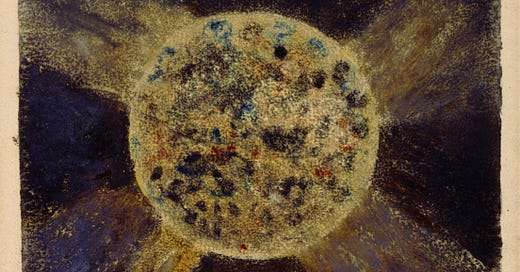Heaven is Pretty Scary
“Eye hath not seen, nor ear heard, neither have entered into the heart of man, the things which God hath prepared for them that love him” (1 Cor. 2:9)
As a young child, I remember privately doubting (and never sharing my doubts with anyone) the existence of an afterlife, or at least entertaining the question “what if” there were no afterlife. What then would there be after death? If there were no heaven, and if the soul did not survive after death, there would be nothing. I would not exist. The fact that I could not imagine not existing, because there would be no I left to exist or to imagine anything, struck a certain terror into me as a child. The very idea of not existing, of having all my senses and consciousness blacked out — this was terrifying. At the same time, however, I also remember taking a certain comfort in the realization that, just as there would be no I to imagine anything, there would also be no I that could be afraid. It seems I was a rather obsessed metaphysician even as a six-year old.
When St. Paul writes “Eye hath not seen, nor ear heard, neither have entered into the heart of man, the things which God hath prepared for them that love him” (1 Cor. 2:9), we are accustomed to reading this quite pleasantly to mean that heaven is more wonderful than we can possibly imagine or conceive. And to be sure, this is entirely true and an entirely justified reading of St. Paul’s words. Heaven is indeed more wonderful than we can possibly imagine.
Lately, however, another way to read it has been faintly echoing in the back of my mind: heaven is entirely unknowable to man. Let that sink in for a moment: heaven is entirely unknowable. What heaven is is a mystery that is entirely inaccessible to us. It is an absolute unknown. As far as we can know, what waits for the righteous beyond their own deaths is a pure void, a nothingness. My belief in heaven has thus converged with my six-year-old doubts about heaven’s existence. Whereas as a six-year-old it was the prospect of heaven’s inexistence that struck me with terror at the absolute unknown that lay beyond death, today it is heaven itself that I identify as this terrifying unknown—although I have now learned to cope and even take comfort in this absolute unknowability.
The mystics often describe contemplation in purely negative terms, even as a kind of cessation of human consciousness—indeed, not merely the consciousness of emptiness or nothingness, but the absence of consciousness itself. This description is strikingly like the mental blackout of ceasing to exist which so terrified me as a child. But today, with the benefit of having experienced consciousness itself as something of a burden and even the root of all my suffering, this prospect of mental blackout doesn’t so much terrify me as console me—so much that I have increasingly come to identify it with happiness, even with beatific vision.
But I still understand the childish fear of the unknowable and the unfamiliar. This is where all humans begin. Childhood is linked to this fear, and growth into spiritual adulthood is linked to transcending and conquering this fear. I still have this childish fear in more ways than I know, as I discover and rediscover in a million ways every day. Moreover, recent conversations with my young son, about the topics of death and heaven, have reminded me that the spiritual life is, to a very large extent, a difficult process of growing out of one’s deepest attachments to this life and all of its familiar comforts. It is a process of becoming less and less at home where one has always felt at home. God knows that I too am not at all free of my childish attachments. Being freed from them is a painful and scary process, and not only my son but I too am still subject to that fear and therefore those growing pains.





I've often seen the idea of the infinite compaired with the idea of no thingness and i think that just goes to highlight the truly otherwordly nature of it and of the self being streached to the infinite